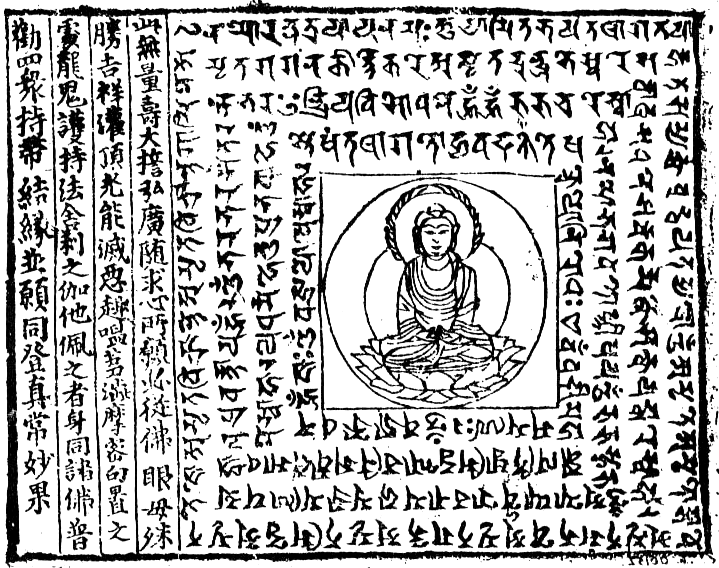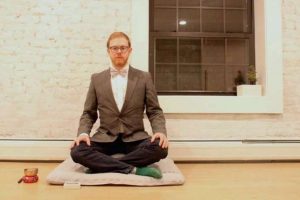
Editor’s note: “Teachings of Amitabha Buddha” is an inspiring column about the vital spiritual matters of Pure Land Buddhism – from its history, philosophy, and practice to its scriptures and their exegesis and interpretation. The column is penned by Alan Kwan, the founding editor of Buddhistdoor.com.
The Path of Great Vow
In the Commentary on the Contemplation Sutra, Master Shandao opened the door to the Pure Land based on the two teachings of two Buddhas. One is known as the Path of Importance, which was expounded by Shakyamuni Buddha. The other is the Path of Great Vow by Amitabha Buddha, with his alternative intent.
When Master Shandao defined the Path of Great Vow in Pure Land Buddhism, he stated: As written in the Great Sutra (The Infinite Life Sutra), “For all good and evil ordinary beings who are reborn [in Pure Land], they rely on the great vow and pure karmic power of Amitabha Buddha as an augmentative cause.”
In the statement, the key words concerning the rebirth of all beings in the Pure Land are ‘vow power’ and ‘augmentative cause’. What great vow(s) did Amitabha Buddha make? Why is it so awesome and powerful that it serves as an augmentative cause for our rebirth in the Pure Land?
The Great Vow
In explaining the fact that Amitabha Buddha is a Buddha in the form of a reward body, Master Shandao quoted (by meaning) the Infinite Life Sutra, and said, “Bhiksu Dharmakara cultivated the Bodhisattva practices at the time of Lokeshvararaja Buddha. He made 48 vows, and each of them is related to [the Great Vow]: If, when I achieve Buddhahood, sentient beings in the ten directions who recite my name, even ten times, should fail to be born there, may I not attain perfect enlightenment.”
This is the 18th Vow, the Fundamental Vow of Amitabha Buddha. Upon Dharmakara’s accomplishment of this vow, he became Amitabha Buddha. In fulfilling it, he takes the initiative to embrace and receive all Amitabha-reciters in the ten directions to be reborn in his Pure Land. The Fundamental Vow of Amitabha Buddha is different from all other Buddhas. Amitabha Buddha said in the Infinite Life Sutra, ‘I develop supreme vows.’ This means his vows surpassed all Buddhas in the ten directions, which was unprecedented.
When Shakyamuni Buddha introduced Amitabha Buddha, he also declared that ‘the vows surpass other Buddhas.’ In other words, Amitabha Buddha’s 48 vows surpassed all the vows made by other Buddhas in the cosmos. Therefore, the great power he achieved (as stated in his Fundamental Vow) is extraordinarily splendid, wonderful and vast, magnificent and deep. It is thus an augmentative cause for our rebirth in the Pure Land.
In his book In Praise of the Rite of Rebirth, Master Shandao praised the Fundamental Vow that generates the strong bonding between Amitabha Buddha and Amitabha-reciters, and serves as an augmentative cause for their rebirth in the Land of Bliss. It states as follows:
Only those who recite the name of Amitabha Buddha are embraced by his light.
One should know [Amitabha’s] Fundamental Vow is most powerful.
Tathagatas in the six directions extend their tongues to witness the vow.
Reciting his name exclusively, they arrive at the Western Land of Bliss.
Augmentative Cause
‘Augmentative cause’ is one of the Four Causal Conditions stipulated in the doctrine of the Yogacara school. It means ‘a determinant factor’ that an external force or power strengthens to put the cause in effect. In the chapter of ‘Meaning of Meditative Practices’ in the Commentary of the Contemplation Sutra, Master Shandao further elaborated the specific meaning of augmentative cause when he explained why Amitabha’s light embraces those who recite his name exclusively. He said, “Sentient beings who recite Amitabha’s name can immediately clear the offenses of many kalpas. When they die, Amitabha and the sacred assembly will appear naturally to welcome them. This cannot be impeded by any negative karma. Therefore [recitation] is known as an augmentative cause.”
As most Buddhists know, the main reason why people cannot be liberated from rebirth within the Six Realms is due to the influence of karma. When one dies, one’s next destiny is determined by the karma in one’s past lives. The Alaya consciousness (or the store consciousness) is dragged along by an individual’s karmic force. One is bound to be reborn in the designated body. One cannot select the path that one wishes to go, as it is obstructed by one’s own karma in past lives.
For an Amitabha-reciter, the situation is different. The Amitabha Sutra says, “If a good man or woman hears of Amitabha Buddha and holds fast to his name for one day … or seven days, single-mindedly and without deviation. Amitabha Buddha and the sacred assembly will appear before that person when he approaches the point of death. When death comes, his mind will not be severely confused. He will at once gain rebirth in Amitabha Buddha’s Land of Bliss.”
The dying person does nothing, but recites his name exclusively, consistently, and persistently. Amitabha Buddha and the sacred assembly will naturally and automatically appear, without any ceremonious invitation or emergency call. Upon arrival, his infinite light will radiate in all directions, which will pacify the dying person’s mind so that he is not confused and frightened. The Buddha’s power will override all wicked negative karmic force. Amitabha Buddha has the full capacity to receive the person to be reborn immediately in the Land of Bliss. As Master Tanluan said in theCommentaryon Treatise on Rebirth in the Pure Land, “Is it inconceivable that one can attain nirvana without cutting off the karmic afflictions?”
How do Amitabha-reciters get connected with Amitabha Buddha?
Master Shandao combined two statements, one from the Amitabha Sutra and the other from the Contemplation Sutra, and said in the In Praise of the Rite of Rebirth, “The Buddha’s light is infinite, illuminating all lands in the ten directions without any obstructions. He contemplates only the Amitabha-reciters, and embraces them without renunciation. That is the reason why he is called Amitabha.”
He further explained how Amitabha Buddha gets connected with the sentient beings in the ten directions, how the great vow works and illustrated the whole principle of Pure Land Buddhism in the same book. He said, “The honored Amitabha set forth an extremely serious vow. He teaches and delivers the sentient beings in the ten directions with his name in the form of his light. It enables them to have faith, have aspiration and to practice in Amitabha-recitation. Whoever recites until the end of his life, or even ten times, or just one time, can be easily reborn by the power of his great vow.”
Here, it is notable that the augmentative cause as stated in the Path of Great Vow is not originated by our faith. In fact, our faith is actually generated by Amitabha’s Fundamental Vow and developed through Amitabha-recitation. ‘Other-power’ is involved in the entire process from the sentient being’s rebirth in the Land of Bliss. Pure Land Buddhism is nothing more than the teaching of the deliverance through the rebirth in the Pure Land by ‘other-power’.According to another work of Master Shandao, the Dharma School of Contemplation and Recitation, he indicated that there are five augmentative causes by his power, as a result of the invocation of Amitabha Buddha. Apart from the most important augmentative cause of deliverance for our future life, the others include: (1) elimination of offenses, (2) protection and virtuous blessings, (3) visualization of the Buddha, and (4) realization and certification for rebirths. These are the peripheral benefits for our present life offered by Amitabha Buddha to reciters of his name.







